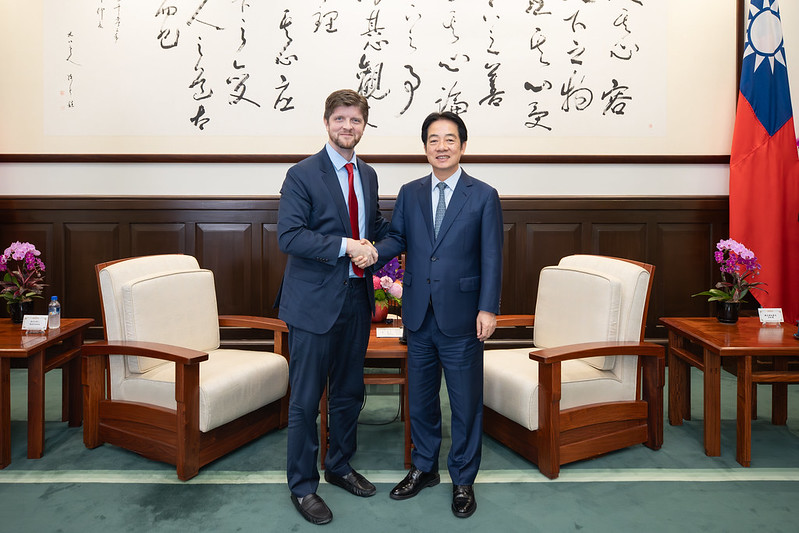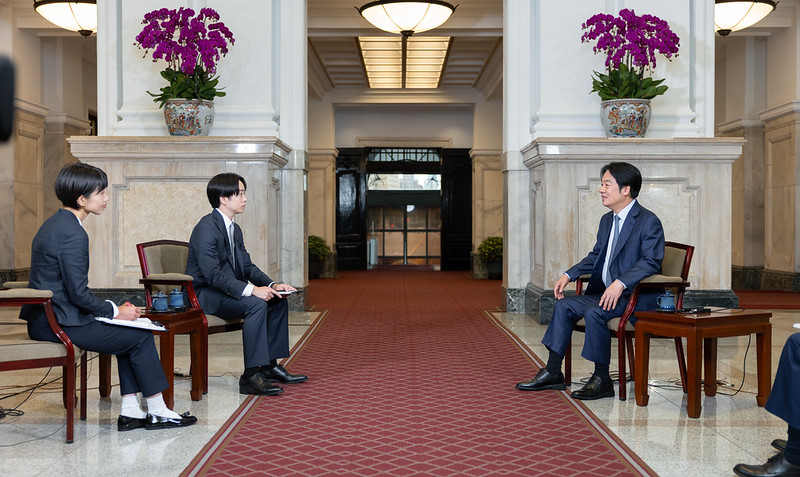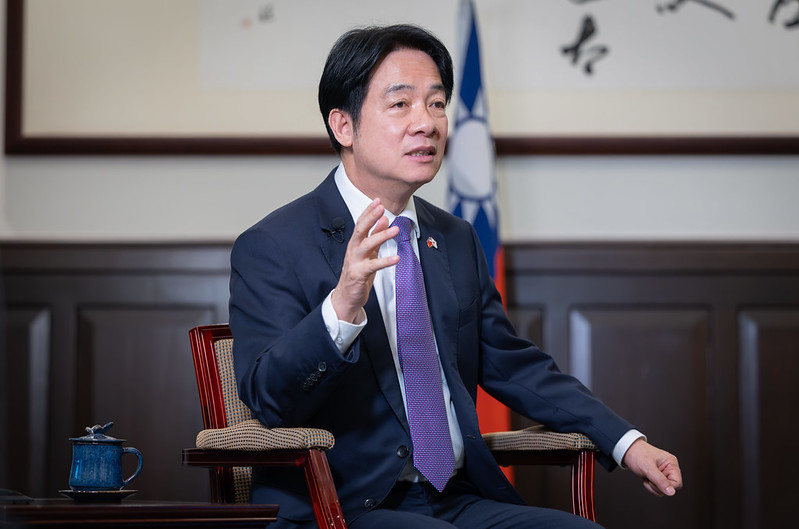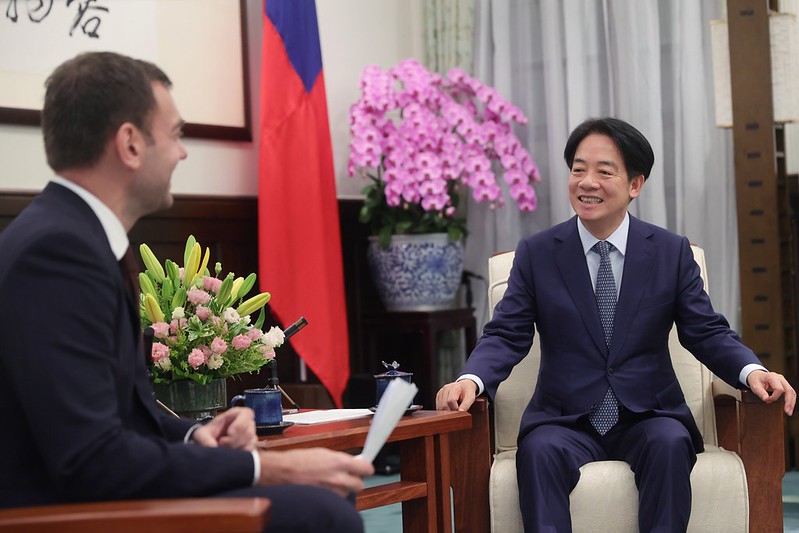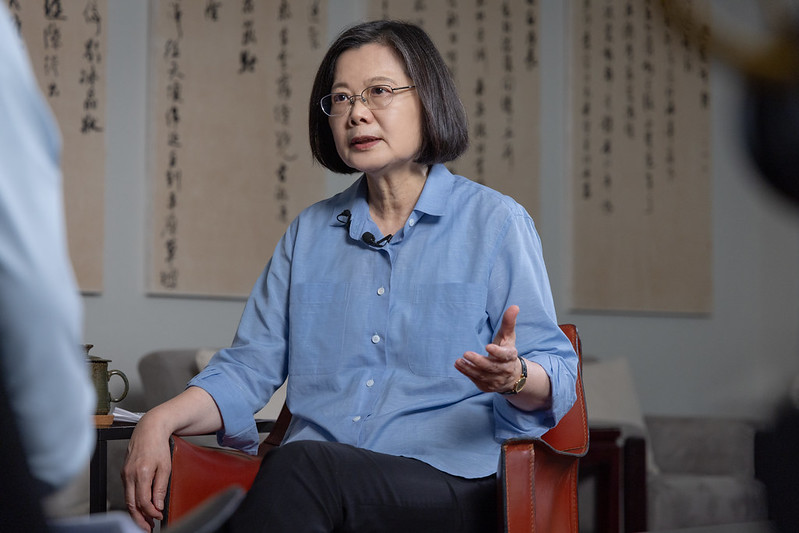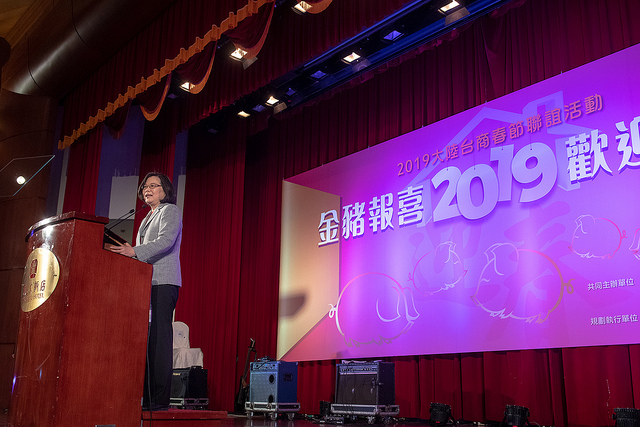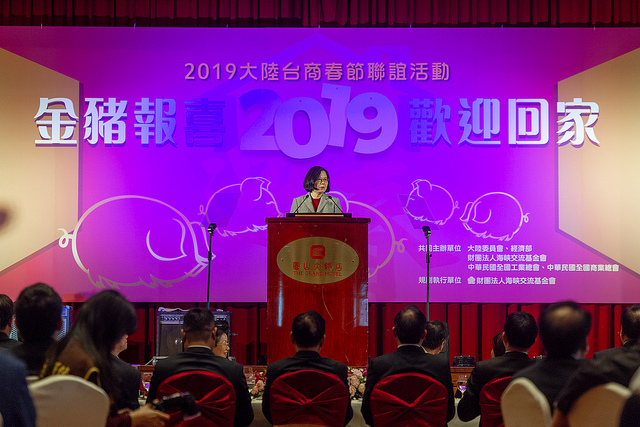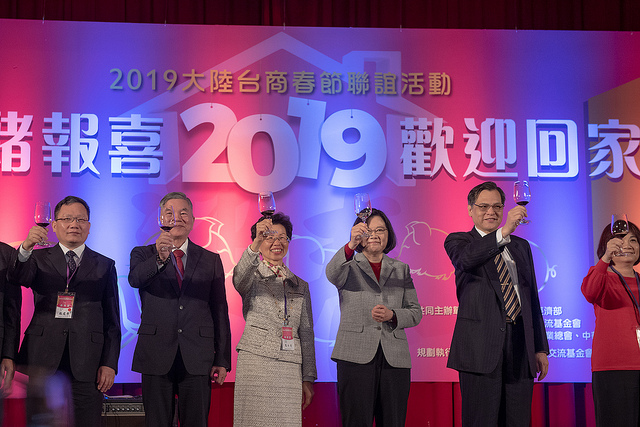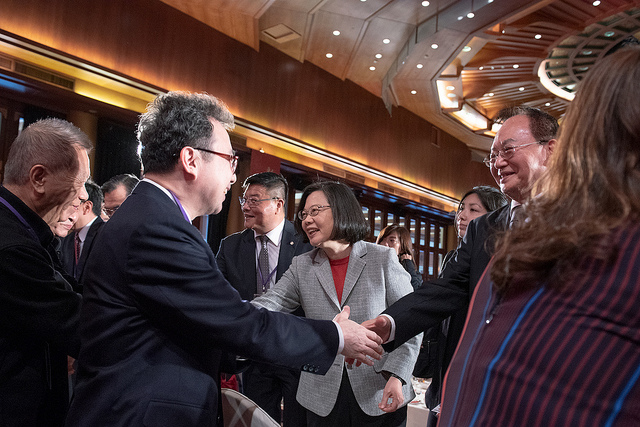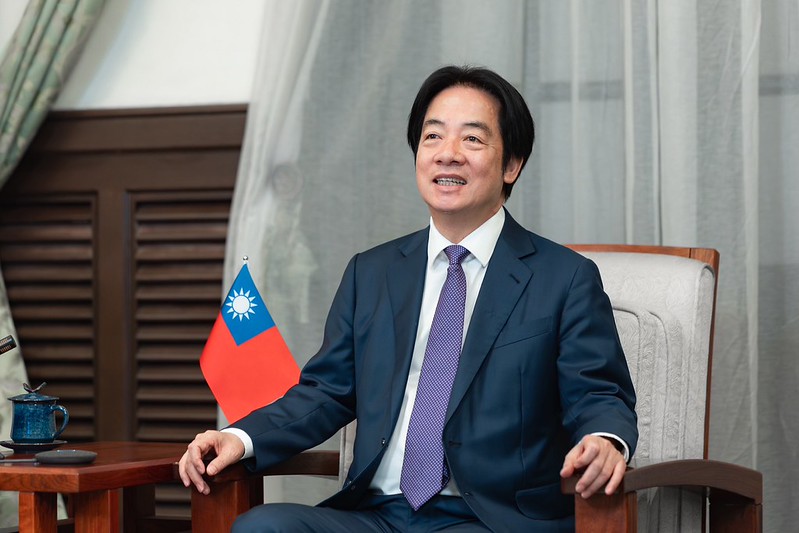News & activities
 News releases
News releases
While attending the 2019 Lunar New Year reception for China-based Taiwanese firms on the morning of February 11, President Tsai Ing-wen stated that the government is adapting to changes in global economic and trade conditions by actively expanding domestic demand, providing full assistance to Taiwanese firms based in mainland China looking to come back and invest in Taiwan, and working to vigorously market Taiwan and help Taiwanese companies to build up a stronger presence worldwide. Commenting on cross-strait relations, the president emphasized that as a responsible member of the international community, Taiwan is committed to maintaining peace and stability in the Taiwan Strait, and she called on all participants in the region to do their part to safeguard regional peace and stability.
The following is a translation of President Tsai's remarks:
On this first working day of the Year of the Pig, I am pleased to meet with industrial and business leaders, as well as friends from Taiwanese firms operating in China. Let me start by wishing you all a Happy Lunar New Year and success and prosperity in the year to come.
Many of you here today are old friends of mine. I often had the opportunity to meet and communicate with friends from China-based Taiwanese firms during my tenure as Minister of the Mainland Affairs Council. Although today I'm with you in a different capacity, my concern for Taiwanese firms abroad remains the same.
All Taiwanese businesspersons love their homeland Taiwan, and home is where the heart is. I am confident that Mainland Affairs Council Minister Chen Ming-Tong (陳明通), Straits Exchange Foundation (SEF) Chairperson Chang Hsiao-yueh (張小月), and SEF Secretary-General Yao Jen-to (姚人多) all maintain smooth channels of communication with all of you. The SEF, in particular, is like a mother to all Taiwanese firms based in China. I hope that your ties with the SEF will continue to evolve in step with the changing times and keep improving day by day.
As you are all successful entrepreneurs, you must be clearly aware that Taiwan faces many economic challenges in 2019. Slower global economic growth and the uncertain future of the US-China trade conflict will inevitably have some degree of impact on Taiwan's exports, economic growth, and industrial environment.
However, economic challenges also present opportunities for transformation and upgrade. The government is confident it can work hand-in-hand with all of you to overcome difficulties and find a way forward for Taiwan's economy.
Since I took office, we have consistently taken three proactive approaches in our efforts to adapt to global economic changes.
The first approach is to expand domestic demand and identify new drivers of growth.
Over the past two-plus years, we have vigorously promoted the "5+2 industrial innovation program," the Forward-looking Infrastructure Development Program, green energy, urban renewal, social housing, and the Long-term Care 2.0 Plan. The overarching objective behind all these measures is to improve Taiwan's overall economic structure and generate more domestic demand momentum. This year, we will accelerate our implementation of these measures.
The government's economic and finance agencies have also recently been taking concrete measures to invigorate domestic consumption and investment. To lower the tax burden, for example, we have raised the standard income tax deduction, lowered the highest tax rate, and adjusted the basic living expense. We have promoted the expansion of subsidies for domestic travel. And we have adopted a discount and subsidy plan to incentivize the purchase of energy-efficient equipment.
Our objective is to maintain stable overall economic growth by ensuring that growth in domestic demand offsets any future impact caused by the slowdown of export growth. I sincerely hope that Taiwanese firms can play a more important role on this front.
Our second approach is to do all we can to help Taiwanese firms abroad come back and invest in Taiwan, thereby enhancing Taiwan's industrial competitiveness.
For Taiwanese firms, the most effective and reliable way to adapt to changes in global economic conditions and new developments in US-China trade relations is to move production bases back to Taiwan. In other words, we need to convert "Made by Taiwanese firms" to "Made in Taiwan" to allow all of you to effectively avoid the impacts of trade sanctions or retaliation.
Especially in light of promising investments and manufacturing processes, including artificial intelligence, the Internet of Things, and Industry 4.0, cheap labor and resource costs are no longer the only factors of consideration for manufacturing firms. I am going to repeat today what I already mentioned in my New Year's address: now is the best time for Taiwanese firms abroad to invest in Taiwan. The government welcomes you with open arms.
Starting this year, we've launched the Welcome Taiwanese Companies Abroad to Invest in Taiwan Action Plan. First, we intend to provide firms with a customized one-stop service window driven by the needs of the firms themselves. Second, we intend to adopt integrated policies regarding land, utilities, manpower, taxes, and financing to help remove investment barriers. And third, please rest assured that the government is determined and able to resolve shortages in the five key production factors—land, water, electricity, talent, and labor—that businesses have been especially worried about over the past years.
The SEF and the Ministry of Economic Affairs have published numerous reports noting that many Taiwanese firms abroad are drawing up plans to return operations to Taiwan. The SEF's Chairperson Chang and Secretary-General Yao have also spoken with me personally on this same subject several times. We are pleased to hear this news, and that's why the theme of today's event is: "Welcome home!" I invite all of you once again to invest actively in Taiwan. Together, we can work to transform and upgrade Taiwan's economy, and enhance our country's international competitiveness.
Our third approach is to market Taiwan and build up a stronger presence worldwide.
Taiwan is a highly open island economy. Exports will continue to be an important driver of economic growth moving forward, so we must redouble our efforts to market Taiwan and ensure that the phrase "Made in Taiwan" impresses people more than ever. We also need to market "Beautiful Taiwan" to our friends around the world, so that they'll put us at the top of their list of overseas travel destinations, further invigorating our economy.
Also, we've made a concerted effort over the past two-plus years to promote our New Southbound Policy, thus taking a key step towards expanding our global reach. Nations across the globe have recently begun seeking to cooperate with countries in the Indo-Pacific region, a testament to our foresight. The government will now begin taking even more decisive action to develop strategic economic partnerships with countries included in the New Southbound Policy, and help Taiwanese companies accelerate their expansion into those countries.
I am confident that if the government and Taiwanese businesspersons engage in full cooperation and make good use of the integrated ability of medium- and large-size Taiwanese firms in regional division of labor and potential for global operation, and if we can further take advantage of the vitality of our small and medium enterprises, Taiwan will certainly have the ability to implement a completely new economic strategy.
And finally, I want to talk briefly about cross-strait relations. Taiwanese firms based in China are very active in the cross-strait economy, and naturally have a keen interest in changes in cross-strait relations. I want to emphasize here once again that we have never opposed cross-strait exchanges. Due to our close geographical proximity, frequent and close exchanges and interactions are natural, and indeed inevitable developments.
Exchanges between Taiwan and China are very close across the board, and interactions like tourism, business, and marriage ties should not be restricted or disturbed by political frameworks or preconditions. Only through parity and dignity in cross-strait relations can we enjoy mutual benefits and create win-win situations. And that is what the people of Taiwan want.
I've always believed that we can and should sit down to discuss any point of contention between the two sides, in order to jointly resolve disputes and differences of opinion.
Cross-strait peace and stability are topics of key importance in the Asia-Pacific region. As a responsible member of the international community, Taiwan will continue working to maintain peace and stability in the Taiwan Strait. But I also want to reiterate that responsibility never rests with just one party, and I hope that all participants in the region will do their part to safeguard regional peace and stability.
I thank you all for taking time out of your busy schedules to attend this Lunar New Year reception. I wish you all good luck, and good business!
